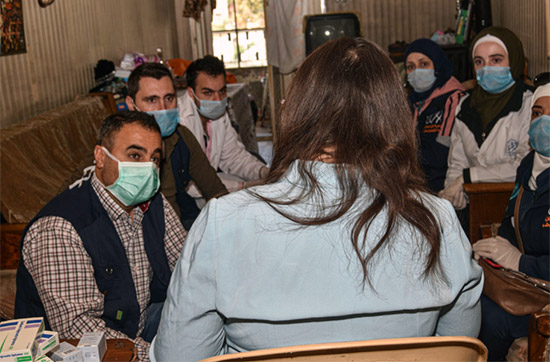 14 October 2020, Syrian Arab Republic – Amid the COVID-19 pandemic, movement restrictions and lockdowns can have as much of a negative impact on people as the virus transmission itself. Patients needing mental health services are most affected, especially those struggling to access treatment at a health care facility. In Syria, 75% of people with mental health conditions receive no treatment at all, and the current pandemic is further aggravating the situation.
14 October 2020, Syrian Arab Republic – Amid the COVID-19 pandemic, movement restrictions and lockdowns can have as much of a negative impact on people as the virus transmission itself. Patients needing mental health services are most affected, especially those struggling to access treatment at a health care facility. In Syria, 75% of people with mental health conditions receive no treatment at all, and the current pandemic is further aggravating the situation.
“There is no health without mental health. We live in an environment where mental health needs are greater than any other place. WHO works with health partners across the whole of Syria to ensure the medicines and health services for mental health patients are available, while reducing their risk of exposure to COVID-19,” said Dr Akjemal Magtymova, WHO Representative in the Syrian Arab Republic.
WHO-supported mobile teams in Aleppo provide home visits to mental health patients
“My mother, sister and two brothers suffer from schizophrenia. In addition, my 9-year-old younger brother is always in seclusion,” said 30-year-old Kawthar.
“During the COVID-19 lockdown earlier this year, there was no public transportation, and I couldn’t get to the hospital, which is quite far, to buy medicines. As a result, their symptoms started worsening; they started hallucinating, their speech was largely disorganized, and they started having bizarre visions,” she added.
To help thousands of people like Kawthar’s family, WHO continues to support health partners to ensure that medicines and health services for mental health patients are available. To reduce the risk of exposure to COVID-19, patients who used to visit the WHO-supported Mental Health Hospital are now visited at home by mobile teams.
Supported by WHO, the mobile health teams serve more than 1500 people in different areas across Aleppo with a wide range of health services such as nursing, mental health and psychosocial sessions, and COVID-19 awareness sessions. They also provide treatment as needed.
Scaling up mental health services in northwest Syria
“Mental health is of particular importance in northwest Syria, where a fragile context has placed additional stress on a vulnerable population who have been living in a dire situation for the last 10 years,” said Dr Mahmoud Daher, head of the WHO Emergency Field Programme in Gaziantep, Turkey.
Where initially there were only 4 psychiatrists serving a population of over 4 million in 2016, WHO has significantly scaled up the training of over 160 doctors and nearly 450 psychosocial workers to provide non-specialized mental health and psychosocial support services in primary health care centres across northwest Syria. Over 20 local organizations inside northwest Syria are operating over 160 facilities to provide mental health care and psychosocial services to 71 communities and 29 sub-districts across the region.
To respond to COVID-19, WHO has partnered with a local nongovernmental organization to implement mental health and psychosocial COVID-19 helplines to support frontline workers, patients, and their respective families to understand and cope with the pressures of the pandemic. Three hotlines are currently active to support individuals across northwest Syria and in southern Turkey.
Syrians take steps in journey of acceptance of mental health needs
Despite the stigma that continues to prove a barrier for patients in accessing mental health care, health partners are noticing an improvement in behaviour change among Syrians, with individuals becoming more self-aware and seeking help when they experience symptoms immediately, instead of waiting until their condition is critical.
Ms Ola Alshab, a psychosocial worker with a WHO implementing partner, provides mental health services to communities living in Idleb.
“Mental health is important. We live in a society that has been affected by war and generally has a lack of understanding regarding mental health and psychosocial needs,” she says.
Despite the still-existing stigma, Ms Alshab has noticed an improvement.
“People have become more accepting of mental health and psychosocial services. When they see the list of symptoms that characterize basic mental health conditions, they can relate to them and ask for help. When they see that a member of their family is benefiting from care, it makes a difference.”








